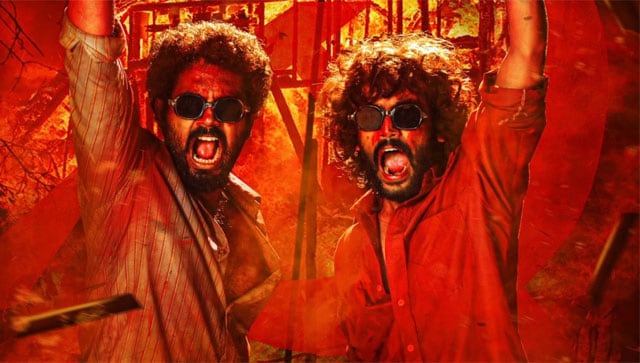In the recent past we have condoned clumsy filmmaking for the sake of a powerful political message (some said it was political propaganda, but we are not here to judge). Writer-director Rafiq Ismail’s Rathasaatchi in Tamil is a powerful and aptly jagged film on the Naxal uprising against caste discrimination in Tamil Nadu.
These are the early years, 1970-80s, of the Naxal movement in Tamil Nadu. The administration wants to crush the Naxal movement as swiftly as possible.So we get, on one level, a gripping cops-and-bandits kind of chase film in which we don’t know which side we are supposed to be on, or which side we want to be.
But it’s not that simple in Rathasaatchi. Writer-director Rafiq Ismail draws a wide arc across the narration, taking us from a relatively simple law-versus-outlaw tale to a very complex thought provoking and disturbing exposition on caste violence , its genesis and its destructive outcome.
The film begins with a poor wagearning woman being kicked into a cauldron of simmering jaggery for trying to steal a tumbler of it for her children Nothing happens. No heads roll. Cops are bribed. Everyone stays mum.
“As long as such incidents happen, the Appus will fight back,” blurts a conflicted guilt-ridden cop (played with rousing sensitivity by Elango Kumaravel) as he burns his khaki uniform in the same campfire in which the Naxalite hero’s clothes were burnt during a fake encounter.
It is decisive no-turning-back moment showing how outlaw and the lawmaker locked in the same line of vision. Such is the power and full brute force of the dying moments in this powerful but uneven story of social inequality and violence that we are tempted to excuse the film’s spasmodic editing that jumps from one virulent episode to another, often in graceless leaps.
This is not one of those films where God lies in the details. God seems to be busy elsewhere as basic human rights are denied to people from the underprivileged classes. The class disparity is depicted in crude overt referential exhibits,almost like museum-hosted renderings of social inequality.
But the rawness works. Harsh facts are not prettified in this straight off take on the rich-poor divide,featuring actors who are unfamiliar faces, all contributing a tremendous workforce of blood sweat and tears.
Kanna Ravi, whom I recall in a few supporting roles, is just the face and personality to play the protagonist Appu who gives up the good life to fight for those who cannot fight for themselves. You may find it difficult to keep track of all the characters. But the precious gift of anonymity that the narrative bestows on the characters gives us the feeling of watching people who don’t mean a thing to the powers-that-be.
Subhash K Jha is a Patna-based journalist. He has been writing about Bollywood for long enough to know the industry inside out.
Read all the Latest News, Trending News, Cricket News, Bollywood News, India News and Entertainment News here. Follow us on Facebook, Twitter and Instagram

